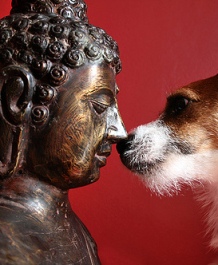 ASANGA gave up. Twelve long years of meditation and spiritual practices, and still no vision of the future Buddha Maitreya.
ASANGA gave up. Twelve long years of meditation and spiritual practices, and still no vision of the future Buddha Maitreya.
He yearned to connect with Maitreya to receive teaching directly, which would accelerate his progress on the Bodhisattva path.
“Every new Bodhisattva or initiated great Adept is called the ‘liberator of mankind,’ Helena Blavatsky explains in footnote (20) in The Voice of the Silence:
“Now bend thy head and listen well, O Bodhisattva,” she wrote, “Compassion speaks and saith: ‘Can there be bliss when all that lives must suffer? Shalt thou be saved and hear the whole world cry?’”
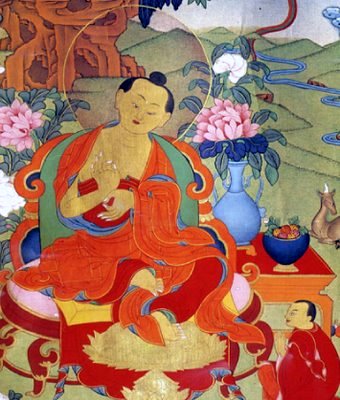
Asanga
After the first three years of spiritual practices to no avail, Asanga left his solitary cave, disheartened. But then he saw a little bird pecking a hole in a rock to build a nest in it, and he felt ashamed at his lack of persistence. He went back up to his cave.
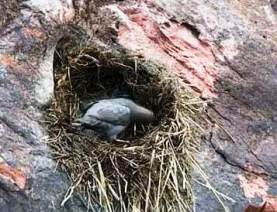
After the next three years, Asanga gave up again. As he descended the mountain, he met a man who was grinding down a thick rod of iron with a cloth to make needles. When the man showed him some needles he’d already made this way, Asanga hung his head and went back up the mountain.
Himalayas
Compassion Breakthrough
After another three years of futile efforts, Asanga abandoned his retreat again. But when he observed a man working a channel through a rock with a hoe, he returned for another three years.
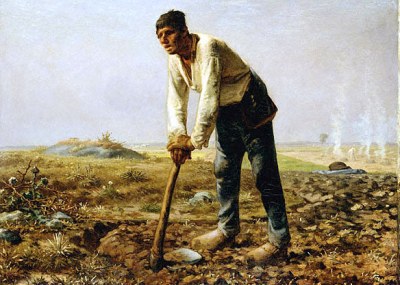
By this time, he’d really had it, and left the mountain for good. As he made his way towards a town, he found a dog wincing in pain because she was covered with ulcers teeming with vermin. Great compassion welled up within him.
But now Asanga had a dilemma: if he removed the maggots by hand, he would kill them; but if he didn’t remove them, the dog would die.

He went into town, traded his mendicant’s staff for a golden knife, and returned to the dog. Cutting flesh from his own thigh, Asanga provided food for the maggots and braced himself to transport the maggots from the dog with his mouth.
As he leaned forward to begin, the dog vanished and the Lord Maitreya appeared in a flash of light. Tears welled up in Asanga’s eyes as Maitreya explained: “The bird, the two men, and the dog, they were all I, Maitreya, your guru.”
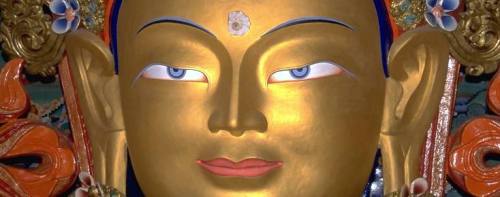
Maitreya explained that it was Asanga’s karma and obscurations that prevented him from seeing his guru for all those years. These obstacles were completely swept away by the power of his compassion for the suffering dog.
To prove the point, Maitreya instructed Asanga to carry him on his back as he walked through town. Even though he asked people what was on his back, everyone said “nothing.” One old woman, though, saw the dog—because of her efforts to purify her karma. Asanga at last understood the boundless power of compassion for transformation.
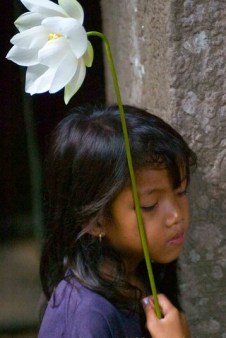
“Karma is an undeviating and unerring tendency in the Universe to restore equilibrium, and it operates incessantly,” wrote William Judge (Aphorisms on Karma):
“The apparent stoppage of this restoration to equilibrium is due to the necessary adjustment of disturbance at some other spot, place, or focus which is visible only to the Yogi, to the Sage, or the perfect Seer: there is therefore no stoppage, but only a hiding from view.’
![]()
Maitreya then transported Asanga to his Tushita heaven and began intensive instruction and even releasing texts to Asanga to establish the Yogacara school of Buddhism in the fourth century A.D.

“The recognition from a Guru will come when you are ready,” explained Judge (Letters That Have Helped Me, Vol. II):
“It is but natural that a student should hope for recognition from a Master, but this desire is to be put aside, and that work is to be done which lies before each. At the same time each one knows that the effect follows the cause, hence whatever our due, we shall receive it at the right time.”
Damodar’s Adventure
Like Asanga, early Theosophy pioneer Damodar K. Mavalankar also wanted to see his Guru and succeeded, even though it almost cost him his life as he recounts the tale here:
“I never stopped to think that what I was going to undertake would be regarded as the rash act of a lunatic. I neither spoke nor did I understand one word of either Bengalee, Urdu, or Nepaulese, nor of the Bhootan, or Tibetan languages. I had no permission, no ‘pass’ … and yet was decided to penetrate into the heart of an independent State where, if anything happened, the Anglo-Indian officials would not — if even they could — protect me, since I would have crossed over without their permission.
Guru Bound
“But I never even gave that a thought, but was bent upon one engrossing idea — to find and see my Guru. Without breathing a word of my intentions to any one, one morning, namely, October 5, I set out in search of the Mahatma. I had an umbrella, and a pilgrim’s staff for sole weapons, with a few rupees in my purse. I wore the yellow garb and cap. Whenever I was tired on the road, my costume easily procured for me for a small sum a pony to ride.

“The same afternoon I reached the banks of the Rungit River, which forms the boundary between the British and Sikkhim territories.
“I tried to cross it by the aerial suspension bridge constructed of canes, but it swayed to and fro to such an extent that I who have never known in my life what hardship was could not stand it. I crossed the river by the ferry-boat and this even not without much danger and difficulty.
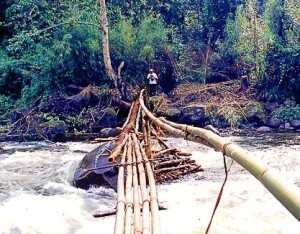
“That whole afternoon I travelled on foot, penetrating further and further into the heart of the Sikkhim territory, along a narrow footpath. Throughout, I saw nothing but impenetrable jungles and forests on all sides of me, relieved at very long intervals by solitary huts belonging to the mountain population.”
Leopards, and Wild Cats, and Brigands, oh my!

“At dusk I began to search around me for a place to rest in at night. I met on the road, in the afternoon, a leopard and a wild cat; and I am astonished now to think how I should have felt no fear then nor tried to run away. Throughout, some secret influence supported me.
“Fear or anxiety never once entered my mind. Perhaps in my heart there was room for no other feeling but an intense anxiety to find my Guru.”
Δ
“When it was just getting dark, I espied a solitary hut a few yards from the roadside. To it I directed my steps in the hope of finding a lodging. The rude door was locked. The cabin was untenanted at the time. I examined it on all sides and found an aperture on the western side. It was small indeed, but sufficient for me to jump through. It had a small shutter and a wooden bolt. By a strange coincidence of circumstances the hillman had forgotten to fasten it on the inside when he locked the door!
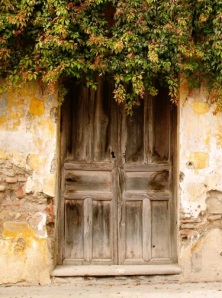 “Of course, after what has subsequently transpired I now, through the eye of faith, see the protecting hand of my Guru everywhere around me. Upon getting inside I found the room communicated, by a small doorway, with another apartment, the two occupying the whole space of this sylvan mansion. I lay down, concentrating my every thought upon my Guru as usual, and soon fell into a profound sleep. Before I went to rest, I had secured the door of the other room and the single window.
“Of course, after what has subsequently transpired I now, through the eye of faith, see the protecting hand of my Guru everywhere around me. Upon getting inside I found the room communicated, by a small doorway, with another apartment, the two occupying the whole space of this sylvan mansion. I lay down, concentrating my every thought upon my Guru as usual, and soon fell into a profound sleep. Before I went to rest, I had secured the door of the other room and the single window.
Staring Into Darkness
“It may have been between ten and eleven, or perhaps a little later, that I awoke and heard sounds of footsteps in the adjoining room. I could plainly distinguish two or three people talking together in a dialect that to me was no better than gibberish.
“Now, I cannot recall the same without a shudder. At any moment they might have entered from the other room and murdered me for my money. Had they mistaken me for a burglar the same fate awaited me. These and similar thoughts crowded into my brain in an inconceivably short period.
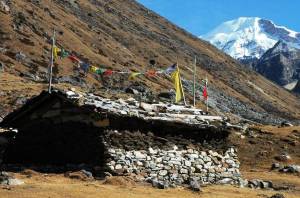 “But my heart did not palpitate with fear, nor did I for one moment think of the possibly tragical chances of the thing! I know not what secret influence held me fast, but nothing could put me out or make me fear; I was perfectly calm. Although I lay awake and staring into darkness for upwards of two hours, and even paced the room softly and slowly, without making any noise, to see if I could make my escape, in case of need, back to the forest, by the same way I had effected my entrance into the hut — no fear, I repeat, or any such feeling ever entered my heart.
“But my heart did not palpitate with fear, nor did I for one moment think of the possibly tragical chances of the thing! I know not what secret influence held me fast, but nothing could put me out or make me fear; I was perfectly calm. Although I lay awake and staring into darkness for upwards of two hours, and even paced the room softly and slowly, without making any noise, to see if I could make my escape, in case of need, back to the forest, by the same way I had effected my entrance into the hut — no fear, I repeat, or any such feeling ever entered my heart.
Protected
“I recomposed myself to rest. After a sound sleep, undisturbed by any dream, I woke and found it was just dawning. Then I hastily put on my boots, and cautiously got out of the hut through the same window. I could hear the snoring of the owners of the hut in the other room.
“But I lost no time and gained the path to Sikkhim (the city) and held on my way with unflagged zeal. From the inmost recesses of my heart I thanked my revered Guru for the protection he had vouchsafed me during the night.
“What prevented the owners of the hut from penetrating to the second room? What kept me in the same serene and calm spirit, as if I were in a room of my own house? What could possibly make me sleep so soundly under such circumstances, — enormous, dark forests on all sides abounding in wild beasts and a party of cut-throats — as most of the Sikkhimese are said to be — in the next room with an easy and rude door between them and me?…”
The Encounter
“It was, I think, between eight and nine A. M. and I was following the road to the town of Sikkhim whence, I was assured by the people I met on the road, I could cross over to Tibet easily in my pilgrim’s garb, when I suddenly saw a solitary horseman galloping towards me from the opposite direction. From his tall stature and the expert way he managed the animal, I thought he was some military officer of the Sikkhim Rajah.
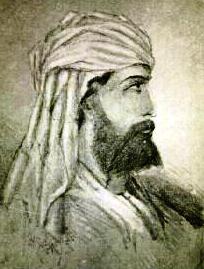 “Now, I thought, am I caught! He will ask me for my pass and what business I have on the independent territory of Sikkhim, and, perhaps, have me arrested and — sent back, if not worse. But — as he approached me, he reined the steed. I looked at and recognised him instantly . . . I was in the awful presence of him, of the same Mahatma, my own revered Guru whom I had seen before in his astral body, on the balcony of the Theosophical Headquarters!…
“Now, I thought, am I caught! He will ask me for my pass and what business I have on the independent territory of Sikkhim, and, perhaps, have me arrested and — sent back, if not worse. But — as he approached me, he reined the steed. I looked at and recognised him instantly . . . I was in the awful presence of him, of the same Mahatma, my own revered Guru whom I had seen before in his astral body, on the balcony of the Theosophical Headquarters!…
“The very same instant saw me prostrated on the ground at his feet. I arose at his command and, leisurely looking into his face, I forgot myself entirely in the contemplation of the image I knew so well…I knew not what to say: joy and reverence tied my tongue.
Mahatma of the Himavat
“The majesty of his countenance, which seemed to me to be the impersonation of power and thought, held me rapt in awe. I was at last face to face with ‘the Mahatma of the Himavat’ and he was no myth, no ‘creation of the imagination of a medium,’ as some sceptics suggested.
“It was no night dream; it is between nine and ten o’clock of the forenoon. There is the sun shining and silently witnessing the scene from above. I see Him before me in flesh and blood; and he speaks to me in accents of kindness and gentleness. What more do I want? My excess of happiness made me dumb.
“Nor was it until a few moments later that I was drawn to utter a few words, encouraged by his gentle tone and speech. His complexion is not as fair as that of Mahatma Koot Hoomi; but never have I seen a countenance so handsome, a stature so tall and so majestic.
“As in his portrait he wears a short black beard, and long black hair hanging down to his breast; only his dress was different. Instead of a white, loose robe he wore a yellow mantle lined with fur, and, on his head, … a yellow Tibetan felt cap….
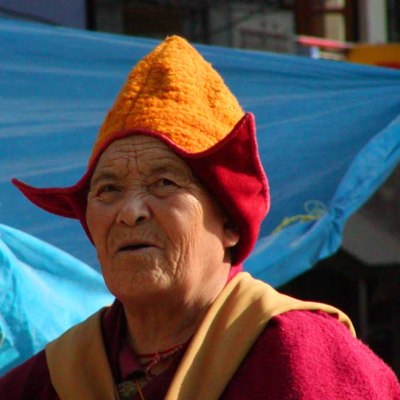
“I had a long talk with him. He told me to go no further, for I would come to grief. He said I should wait patiently if I wanted to become an accepted Chela; that many were those who offered themselves as candidates, but that only a very few were found worthy; none were rejected — but all of them tried, and most found to fail signally…. I asked the blessed Mahatma whether I could tell what I saw and heard to others. He replied in the affirmative, and that moreover I would do well to write to you and describe all.”
© Kara LeBeau 2009. All rights reserved.
(Originally published as “Buddha and His Dog”)
Himalayas
Video footage is excerpted from the BBC all music arranged and composed by Rachel Scott – recorded at Townie Productions Weymouth.
♥
“All men dream but not equally. Those who dream by night in the dusty recesses of their minds wake in the day to find that it was vanity; but the dreamers of the day are dangerous men, for they may act their dream with open eyes to make it possible.”
~ T.E. Lawrence

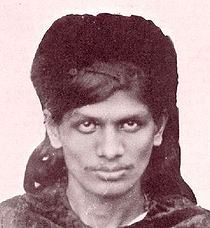
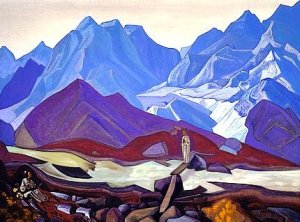
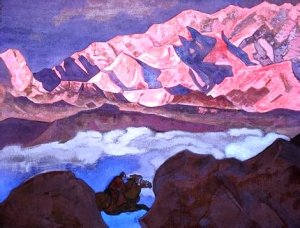
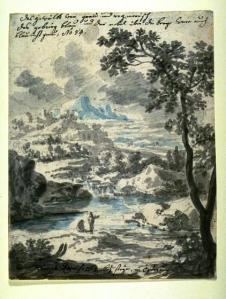




Any comment will of necessity leave so much unsaid. So here goes.There is so much ambition involved, within humanities spiritual search! This is self evident, is it not? Damodar as a man, in many respects, was an exception to the common human culture, of spiritual ambition. That desire for recognition that sees accolades, ribbons, certificates, titles and office bestowed on ones person. Damodar, without so much as a word, abandoned it all. He abandoned theosophical pride, prestige, office…. and so on. He abandoned safety, personal, financial and philo-religious. He abandoned it all. What then, was there in this small minded world of ours, that could stop him. Thank you for the piece of Damodar.
APH Melbourne
LikeLike
Very well said, thank you for your comment. Namaste!
LikeLike
Who is the author of Mahatma of the Himavat? This was an incredibly inspiring story of perseverance. Thank You!
LikeLike
This true story was written by Damodar K. Mavalankar, a Hindu Theosophist contemporary with Mme. Blavatsky. More information is found at the following link: http://davidpratt.info/damodar.htm
LikeLike
Catherine, I get these direct. No need to foreward them to me. They good to post to NZ Public discussion list though. 🙂
_____
LikeLike